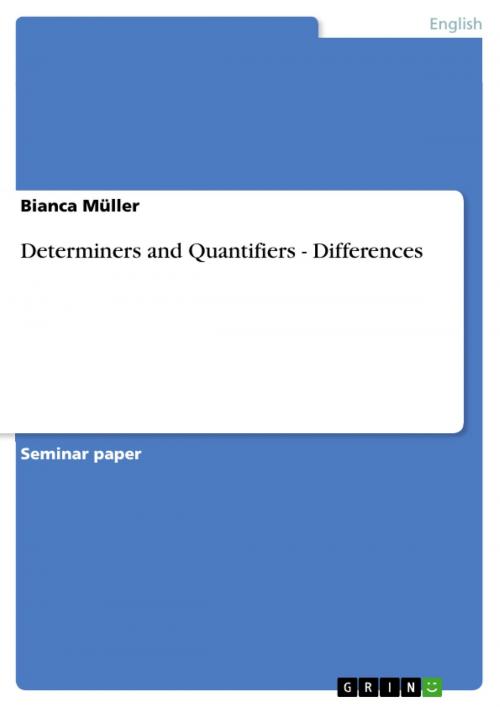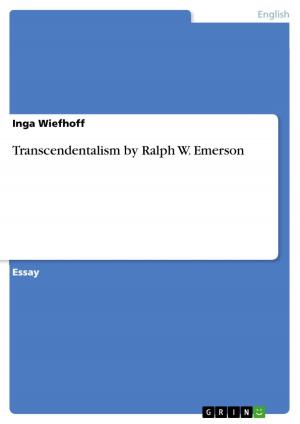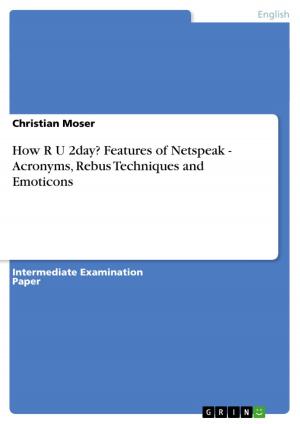| Author: | Bianca Müller | ISBN: | 9783640603206 |
| Publisher: | GRIN Publishing | Publication: | April 23, 2010 |
| Imprint: | GRIN Publishing | Language: | English |
| Author: | Bianca Müller |
| ISBN: | 9783640603206 |
| Publisher: | GRIN Publishing |
| Publication: | April 23, 2010 |
| Imprint: | GRIN Publishing |
| Language: | English |
Seminar paper from the year 2008 in the subject English Language and Literature Studies - Linguistics, grade: 2,3, University of Wuppertal, course: Hauptseminar 'Nouns and Noun Phrases', language: English, abstract: 1.Introduction Determiner and quantifier - two technical terms for two distinct word classes, or does the latter denote a subset of the former? Paying attention to the linguistic discourse does not solve these questions at once. There are numerous differing and even contradictory notions of classification possibilities concerning the entities in question. The outcome of multiple approaches is that quantifiers denote a sort of subtype of the syntactic category determiner (Crystal 1995:222, Huddleston et al. 2002:356ff, Longbardi 2001:581f, Stowell 1991:47f, Quirk et al. 1972:138f). In addition, the concept was put forward that determiner and quantifier act as functional categories within the class of pronouns (Long 1961:46ff, Radford 2004:45). Yet another opinion is held by Lyons (1999:298ff), who suggests that determiner phrases do not represent a word class, but the grammatical category of definiteness. This brief summary of possible classifications only foreshadows the numerous similarities, but at the same time the differences, of the variety to be classified. Nevertheless, the purpose of this term paper is to name and describe these differences. In order to do so, a feature-based-analysis with respect to syntactic and semantic properties of the relevant members, bearing the label determiners and quantifiers will be presented. On the basis of this outcome, a conclusion will be drawn. However, the overall expectation to classify one, or possibly two, unitary categories cannot possibly be met within the framework of this work. Before turning to the core of this term paper, some abbreviated remarks have to be made in order to set a frame for the subsequent paper.
Seminar paper from the year 2008 in the subject English Language and Literature Studies - Linguistics, grade: 2,3, University of Wuppertal, course: Hauptseminar 'Nouns and Noun Phrases', language: English, abstract: 1.Introduction Determiner and quantifier - two technical terms for two distinct word classes, or does the latter denote a subset of the former? Paying attention to the linguistic discourse does not solve these questions at once. There are numerous differing and even contradictory notions of classification possibilities concerning the entities in question. The outcome of multiple approaches is that quantifiers denote a sort of subtype of the syntactic category determiner (Crystal 1995:222, Huddleston et al. 2002:356ff, Longbardi 2001:581f, Stowell 1991:47f, Quirk et al. 1972:138f). In addition, the concept was put forward that determiner and quantifier act as functional categories within the class of pronouns (Long 1961:46ff, Radford 2004:45). Yet another opinion is held by Lyons (1999:298ff), who suggests that determiner phrases do not represent a word class, but the grammatical category of definiteness. This brief summary of possible classifications only foreshadows the numerous similarities, but at the same time the differences, of the variety to be classified. Nevertheless, the purpose of this term paper is to name and describe these differences. In order to do so, a feature-based-analysis with respect to syntactic and semantic properties of the relevant members, bearing the label determiners and quantifiers will be presented. On the basis of this outcome, a conclusion will be drawn. However, the overall expectation to classify one, or possibly two, unitary categories cannot possibly be met within the framework of this work. Before turning to the core of this term paper, some abbreviated remarks have to be made in order to set a frame for the subsequent paper.















